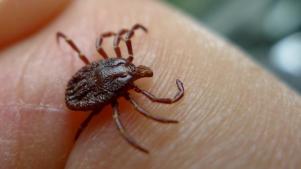- Managing your Practice
-
- Your Benefits
-

Introducing the ultimate Club MD experience
From work to play, and everything in between, we provide you with access to hundreds of deals from recognizable, best-in-class brands, elevating every facet of your life – from practice supports to entertainment, restaurants, electronics, travel, health and wellness, and more. Your Club MD membership ensures that these deals are exclusive to you, eliminating the need to search or negotiate.
Welcome to the ultimate Club MD experience. Your membership, your choices, your journey.
-
- Advocacy & Policy
-
- Collaboration
- News & Events
-

Stay Informed
Stay up to date with important information that impacts the profession and your practice. Doctors of BC provides a range of newsletters that target areas of interest to you.
Subscribe to the President's Letter
Subscribe to Newsletters
-
- About Us
-

Tick talk: protecting yourself from ticks and tick-borne diseases
July 6, 2018
Together for Health
With summer upon us, the warmer weather means an increase in the number of ticks and tick-borne diseases including the most common, Lyme disease. Transmitted through a tick bite, Lyme disease causes symptoms such as rash, fever or chills, headache and muscle and joint aches. But if left untreated, it can lead to more serious issues such as paralysis and heart and neurological disorders.
 A tick is a small, dark, spider like bug most commonly found in tall grasses and wooded and forested areas – places that draw many summer outdoor enthusiasts – where it patiently lies waiting for exposed skin to come along. In recent years, the number of cases of Lyme disease in Canada has been steadily growing with a reported 1,479 cases in 2017 – something the Public Health Agency of Canada calls a “significant national increase” of nearly 50 per cent over the previous year.
A tick is a small, dark, spider like bug most commonly found in tall grasses and wooded and forested areas – places that draw many summer outdoor enthusiasts – where it patiently lies waiting for exposed skin to come along. In recent years, the number of cases of Lyme disease in Canada has been steadily growing with a reported 1,479 cases in 2017 – something the Public Health Agency of Canada calls a “significant national increase” of nearly 50 per cent over the previous year.
To protect yourself, here are some steps you can take to limit your exposure to ticks and tick-borne diseases:
- Wear a Health Canada-approved insect repellent containing DEET on exposed skin and clothing
- Wear long pants tucked into socks and long sleeves and light colours to make the dark ticks easier to spot
- Stay on trails when hiking in the woods or walking in areas of long grass
- Do a full body check when you get home — especially toes, knees, groin, armpits and scalp — and check your pets, too
- Keep ticks away from home by keeping grass mowed, removing brush and fallen leaves, cleaning up areas under bird feeders to ward off small mammals that can carry ticks and keep woodpiles dry and away from the house
- What to do if you find a tick on yourself?
- Remove it as quickly as possible — the risk of Lyme disease increases with the length of time it’s attached
- Use tweezers or a “tick key” to grasp the tick’s head as close to the skin as possible and pull slowly, without twisting, until it comes out
- Once the tick has been removed, clean the bite area with soap and water then apply an antiseptic cream. Wash hands with soap and water or use alcohol-based hand rub
- See a doctor if you’re unsure of how long the tick has been attached or if it’s been more than 24 hours
These simple steps will help ensure your summer is tick free, though should you find one buried in your skin or know you’ve been bitten, experts suggest consulting a health care professional.
Media stories on this topic:
CBC Radio – Get ready for Lyme disease
CTV News Vancouver – The best ways to prevent and protect against ticks
Global News – Little girl temporarily paralyzed after tick bite
Global News – Toronto Public Health issues warning about ticks, Lyme disease
Global News – Tick forecast 2018: Experts predict more Lyme disease in Canada




